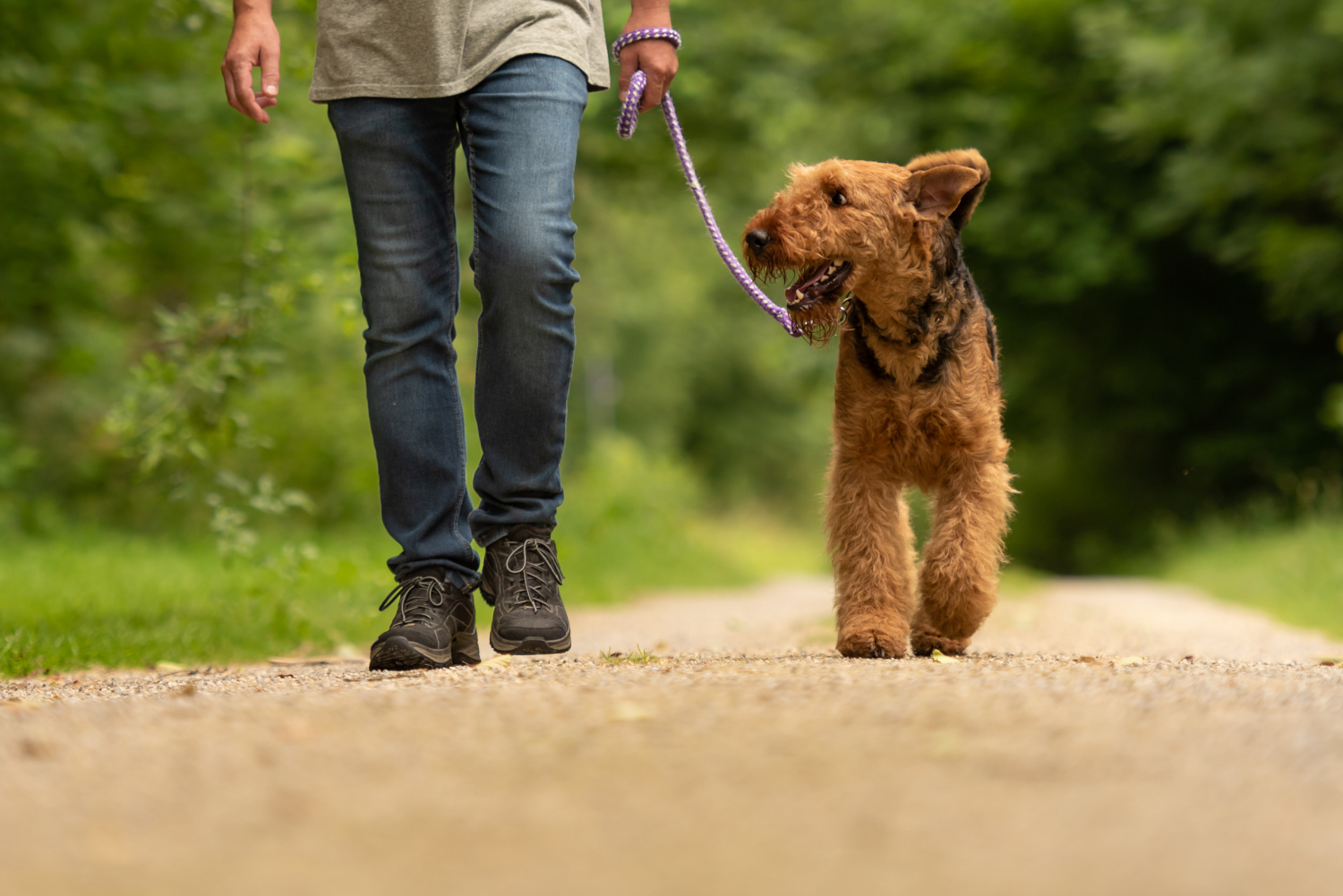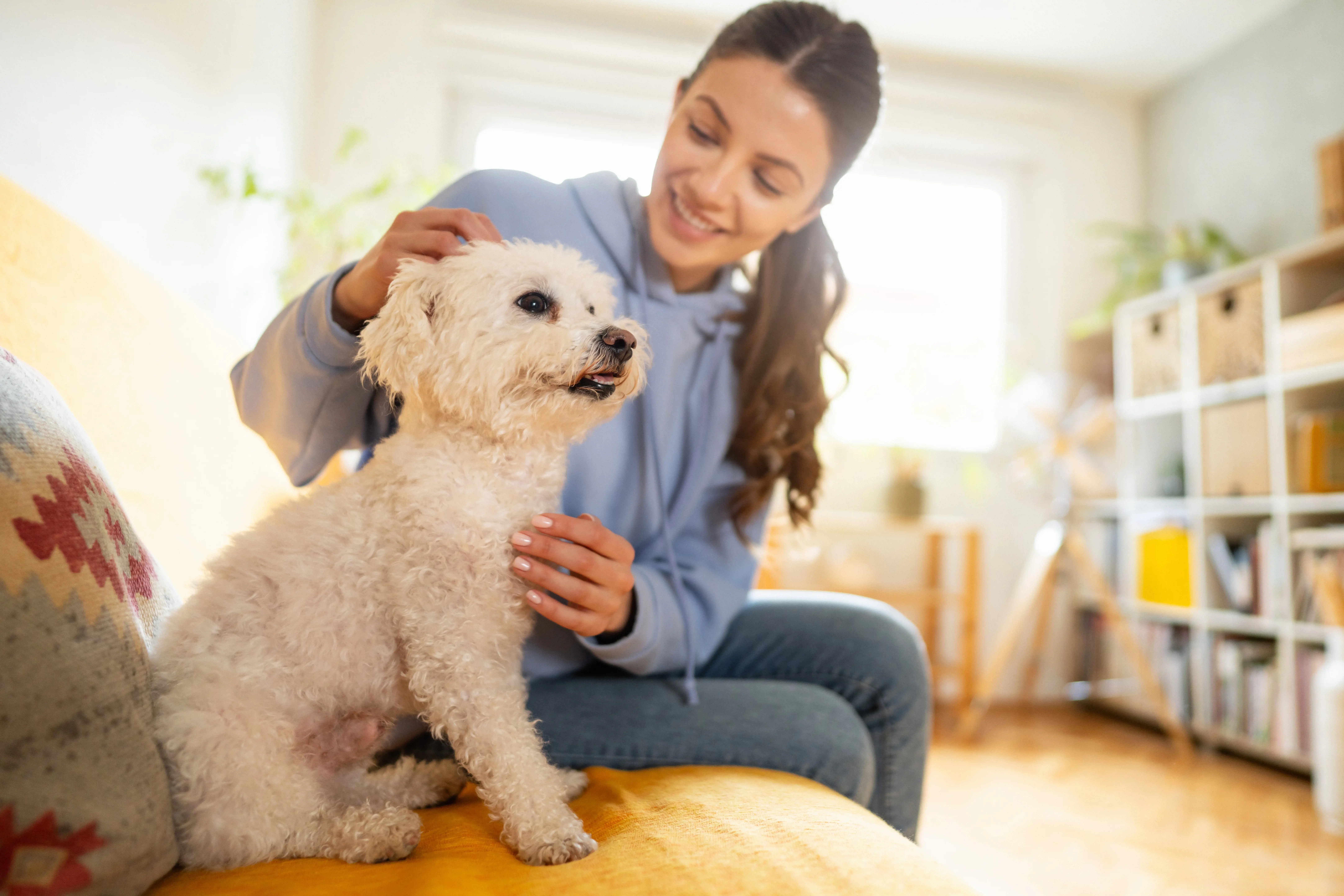Are dogs good for mental health?
24th October, 2022

Dogs have been our best friends for centuries and are more loyal than most creatures on Earth, but are they good for your mental health? Find out the various ways they can benefit your mind below.
When the Coronavirus pandemic hit in 2020, many people’s mental health suffered as a result. According to The University of York, those who owned pets maintained a better state of mind and felt less lonely while locked indoors.
Pet ownership numbers increased as a result and owners continue to sing the praises of their animals, saying they help them stay fit and healthy, both emotionally and physically.
So, what exactly can your four-legged family member do for your mind? What if you want to reap the rewards of a canine companion but can’t keep one at home? And how can you take care of your dog’s mental health in return?
We share all the answers as well as why you should protect your dog with one of our Purely Pets lifetime dog insurance plans.
Mental health in the UK
In recent years, the number of people reported to have mental health problems has been constantly rising. According to mental health charity Mind: “Around a third of adults and young people said their mental health has got much worse since March 2020.”
They also say that “1 in 6 people report experiencing a common mental health problem in any given week in England.” This can be anything from chronic stress to anxiety and depression.
As a result, we’re always on the lookout for new ways to treat these conditions and improve our state of mind.
Doctors are quick to prescribe medicine, but patients are now searching for more natural methods to relieve their symptoms – dogs could be one of these.
What are the mental health benefits of owning a dog?
It’s not only their help during the pandemic that has given dogs the reputation of having a positive effect on our mental wellbeing. Dogs are masters at:
- Providing loyal companionship
- Reducing stress levels
- Increasing your overall physical wellbeing
- Helping you meet new people
- Giving you a purpose in life
- Supplying inspiration
- Giving you the opportunity to learn from them
As your pet is such a loyal companion and can help you in so many ways, it’s only natural to want to shower them with all the love and care possible in return. A great place to start is through lifetime dog insurance plans.
Even when you keep your dog healthy and safe, accidents can happen, and sudden illnesses sometimes develop. Comprehensive coverage means they can get financial help towards the urgent care when they need it most to let them live life to the fullest!
Let’s take a closer look at each benefit and how canines can help your mental health.
Companionship
Almost half of all dog owners describe their pet as their best friend, and companionship is the top reason to get a dog in the UK. It’s not surprising when you consider a dog’s ability to make us laugh and cheer us up when we’re feeling blue.
A dog is always willing to listen to your troubles without judgement and provide a warm shoulder to cry on. They keep you company in lonely times and can also make excellent playmates for kids.
CareDogs estimates at least 500,000 older people in the UK “go a week without seeing or speaking to anyone at all.” A four-legged friend in these lonely moments can make a world of difference to someone who is by themselves and motivate them to get up and out of the house.
Wellbeing
If you’re feeling down, it can be difficult to make yourself leave the house. When you have a dog, they need regular walks, which encourages you to get out and explore the great outdoors. Fresh air and nature can both help to boost your mental health.
How about those cosy cuddles you enjoy on the sofa in the evening? These snuggle sessions do wonders for your wellbeing, too. Stroking your dog lowers stress levels and lifts your mood thanks to the happy hormone endorphins it releases.
Don’t forget to repay their love and loyalty with dog insurance plans to protect them when they need it most.
Helping you meet new people
We’ve already mentioned how loneliness can make you feel blue. Your beloved pet can help you much more than lending an ear to talk to or being your go-to night time cuddle companion.
With more ‘walkies’ comes the chance to meet new people. When you head out on the same route each morning, you get to know other dog owners and start chatting. You might even get some top pet-owning tips, like what treats to feed your animal and where to find the best dog insurance plans.
There are lots of other activities and places for you and your dog to meet other people, too:
- Training classes
- Pet shops
- Dog activity groups
- Grooming parlours
- Dog shows and events
- Dog-friendly cafes and pubs
Giving you a purpose
Sometimes, getting into a routine is tough, especially if you’d rather be lying in bed or catching up on your favourite programmes on the TV.
When you become a pet parent, you have a purpose to get up, get dressed, and head out the front door. Your dog relies on you for food, toileting and exercise – all essential to their development and health.
Inspiration
Canines tend to have a care-free attitude and live each day to the fullest. They can make fun out of most situations and are always raring to go when the ‘W’ word gets mentioned, which makes them impressive role models to many humans.
Many great historical figures claimed their dogs were what made them what they are today, including:
- The famed British composer Edward Elgar who claimed his dogs inspired many of his pieces, especially his bulldog, Dan.
- ‘The Lady with the Lamp’ Florence Nightingale, whose dog got back on all four paws thanks to her care and inspired her to enter the medical field.
- Pop artist Andy Warhol, who said his dogs helped him cope in socially awkward situations and formed a consistent part of his public persona.
Learning from them
If you ask dog owners what their pet has taught them, a majority will say they learned what true friendship means and how to love.
When dogs are part of a family with children, they can also help boost a youngster’s confidence, teach them empathy and how to care for living creatures.
Research even shows that your child can improve their literacy skills by reading a story to their four-legged friends. The Bark and Read Foundation aims to do just this by helping the younger generation develop a passion for books.
What are the physical benefits of getting a dog?

Some of the advantages to your mental health stem from the physical benefits your dog provides. When you’re healthier and fitter overall, you’re more likely to have a positive mindset. Here’s a closer look at how dogs can help your physical health.
Fitness
We all know keeping fit is part of a healthy lifestyle but getting up for a run when it’s raining outside is enough to make you hit the snooze button.
When you get a dog, you can’t put off that morning walk before you head to the office. Your dog needs you to take it out to exercise and go to the toilet.
As a result, pet owners are far more likely to meet the daily exercise requirements than those who don’t have an animal. Long hikes outdoors or runs with your four-legged friend can help you get in shape and lose weight, boosting your self-confidence and mental health at the same time.
Overall health
Once you get into a regular walking routine with your pet, you should start to feel other positive impacts on your physical health. Daily outings with your dog can help:
- Improve blood pressure
- Lower cholesterol
- Strengthen bones and muscle
- Build immunity and prevent allergies
All of these contribute to your mental wellbeing, too, as most people feel happier when they have no health issues.
While looking after yourself, don’t forget your dog. Make sure you look into dog insurance plans to protect their health and to help with any unexpected vet bills.
Which dog breeds are best for anxiety?
While just about any canine can help calm your anxiety, there are a few breeds that are especially suitable and share a number of traits.
To reduce stress and improve your symptoms, look for a dog that is:
- Calm
- Friendly
- Affectionate
- Loyal
- Outgoing
- Well-behaved
- Easy to train
You also need to consider your personal preferences and what you think can help calm your anxiety.
If you want to take your dog everywhere, a smaller breed might be better. Small dogs are also a good choice if you don’t have a lot to spend as they’re usually cheaper to .
If you're hoping for lots of cuddles on the sofa, a large dog can give a wonderful whole-body snuggle.
Once you know what you’re looking for, have a look at our list of top dog breeds for anxiety and see which you think could make a great companion.
Large dog breeds that are good for anxiety
- Labrador Retriever
- Golden Retriever
- Poodle
- Greyhound
- Great Dane
- Border Collie
- Beagle
Small dog breeds that are good for anxiety
- Pomeranian
- Yorkshire Terrier
- Pug
- Bichon Frise
- Cavalier King Charles Spaniel
- Pembroke Welsh Corgi
These dogs all make wonderful furry friends. They each have a calm nature, love a cuddle, and are as loyal as they come.
If you make the decision to get a dog to help with your anxiety, you’ll need to be a responsible pet owner and look after its health while supplying lots of affection.
Stay up to date with vaccinations, get them microchipped, and talk to our team at Purely Pets about one of our lifetime dog insurance plans. Comprehensive coverage ensures less financial worries after an accident or when they fall ill.
Is getting a dog right for me?
The thought of getting a dog might seem appealing, but before you adopt or buy your four-legged friend, ask yourself if you have the money, time, and energy to dedicate to an animal.
Bringing a dog home is a serious commitment and you must make sure you can take care of all its needs. Pets can cost up to £30,000 over their lifetime according to the PDSA.
You need plenty of time and energy to take them out on regular walks (how many per day will depend on the breed) and supply a healthy diet.
Ask yourself the following questions to see if you’re ready for a furry family member in your home:
- Are you an active individual?
- How much time can you spend with your pet?
- How much money do you have for food, toys, dog insurance plans, and vet bills?
Only when you’re sure your dog will have a caring and loving environment with plenty of exercise and health care should you bring one home.
What if I can’t get a dog?
Perhaps you’re longing for a canine companion but can’t have one. If you rent, you might not be allowed one where you live. Maybe you can’t afford it right now or are worried about feeling too unwell to care for it sometimes.
There are many reasons why a pet at home isn’t the right choice for you, but it doesn’t mean you can’t spend time with dogs to help your emotional wellbeing.
- Visit friends or family who own pets and offer to dog-sit when they go to work or on holiday.
- Volunteer as a dog walker in your neighbourhood or at a rescue centre.
- Search for dog befriending services in your area to spend time with dogs while playing and walking.
- Consider fostering to help out dogs in need without the lifelong commitment.
- Contact local shelters and organisations to see if they need volunteers to care for and socialise with their dogs.
How do I find a dog befriending service in the UK?
For individuals who can’t have a dog at home, befriending services are one of the best ways to get your dose of doggy love and boost your mental health.
Various organisations exist and can help you find a dog for your circumstances.
- Borrow My Doggy connects owners with those looking to spend some valuable time with animals, whether it be for a daily walk or to take care of it while their pet parent goes on holiday.
- CareDogs helps older people who want canine companionship by pairing them with volunteers and their dogs for frequent visits.
- Wag and Company also works to provide older dog lovers the chance to befriend local four-legged friends for a chat and a cuddle in their house, a care home, or a hospital.
Whether you want to beat loneliness or miss the warm cuddles from a late furry friend, dog befriending services could be what you’re looking for.
You get to enjoy an unconditional friendship without having to worry about the costs of owning a pet or whether you have the time to care for them.
How do I spot anxiety in my dog?

It’s not only us humans who suffer from mental health concerns. Canines experience anxiety too, and it can severely affect their ability to lead a healthy and happy life.
How can you tell if your dog is feeling anxious? Battersea Dogs Home says to look out for the following signs:
- Tail between their legs
- Pinned back ears
- Excessive panting
- Licking their lips
- Raising their paw
- Yawning
- Pacing
It can be upsetting to see your dog feeling down, which could cause you to feel anxious, too. If you notice these symptoms or sense something isn’t quite right with your animal, contact your vet.
They’ll likely ask you what you believe the source of your dog’s anxiety is, which can stem from various reasons such as boredom, frustration, separation anxiety, or fear.
Exercise is an excellent way to relieve some of your canine’s stress. Your dog can run off all its excess energy while boosting serotonin levels to make it feel good.
You can try distraction techniques like teaching new tricks or buying them novelty toys. Leave the radio on if they have to be left at home so they don’t feel quite so alone.
Note that these are only short-term solutions and your vet can help you find a more effective, long-term remedy to their anxiety.
Protect your dog with pet insurance
Do you have a loving dog at home who you want to protect? Or are you hoping to welcome a four-legged friend into your family soon and want to cover them in case of an accident or illness?
By choosing one of the lifetime dog insurance plans from Purely Pets you make sure your beloved pet gets the right help when it needs it most.
We offer 15 levels of lifetime cover to choose from with up to £15,000 protection. We welcome dogs as young as 8 weeks old and have no upper age limit, so you can care for your senior pet throughout its golden years.
If you want to protect your pet with award-winning comprehensive coverage, contact the Purely Pets team for a quote today.
Discuss our range of dog insurance plans and find the right one for your canine companion.
Helpful Pages
Recent Posts
Pet Insurance Quote
- 98% claims paid *
- Claims paid directly to vets
- 24/7 vet video consultations
- Interest free monthly payments




